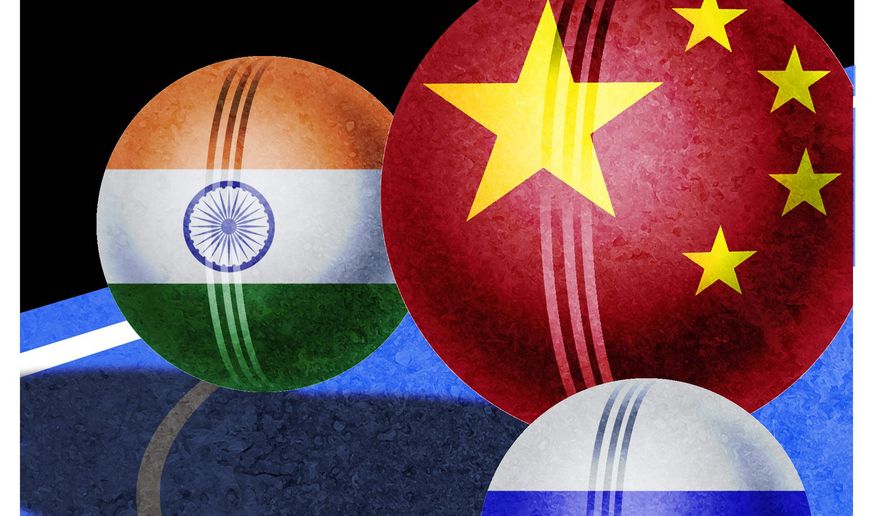OPINION:
Russian Foreign Minister Sergei Lavrov on Dec. 10, 2020, addressed the Russian International Affairs Council, where he made observations that some Western countries are using India to engage in their anti-China policy by promoting the Indo-Pacific strategy.
This is not the first time such comments have been made by the foreign minister. Earlier, in his February 2019 remarks, he denounced the Indo-Pacific as an artificially imposed construct of the United States, along with Japan and Australia, within the far-reaching context of containing China and trying to involve India in military-political and naval processes.
Subsequently in January 2020, Mr. Lavrov reiterated his critical statement on the Indo-Pacific during his visit to India. While the previous remarks were either ignored or given less attention, his latest criticism has caused discontent in India, because they were made when both Indian and Chinese forces have been locked in a military standoff in the disputed Ladakh region since June 2020.
Russia has been a long-standing and time-tested partner for India with similar world views on a common quest for multipolar world order, opposition to the emergence of an Asian hegemon and greater geopolitical compatibility. Despite all these convergences, Russia is reluctant to endorse the Indo-Pacific construct and in fact opposes it, despite India’s interest in the strategy.
As Russia resolutely opposes the construct, there is an increasing concern in India that Russia might be doing China’s bidding or Russia is a junior partner in its relationship with China. But the question is are these concerns warranted and can Russia be a reliable partner for India in the Indo-Pacific region? To understand Russia’s perception, it is important to have a holistic view of its role in the region and not interpret its intention based on its disapproval.
Russia’s reluctance to endorse the Indo-Pacific construct stems from various factors. One primary reason is because of the sanctions imposed by Western countries after the Crimea incident in 2014. It left no choice for Russia but to increase its engagement with China. As its relationship with the West reached a new low due to the crippling economic effects of the sanctions, both China and Russia came more strategically closer than at any point of time since their 1950s communist camaraderie.
The two pillars of Sino-Russian entente are economic factors and their shared opposition toward the United States. In 2018, Russia’s trade with China accounted for 15.5% of its overall trade. On the other hand, China’s trade with Russia accounted for 0.8% of its total trade, and Russia is aware of its vast economic mismatch in relation to China. Hence, it continues to foster good relationships and not antagonize China by endorsing the Indo-Pacific construct.
The other important reason for Russia’s reluctance is that, although the Indo-Pacific construct has been there officially since 2013, it has only gained traction following the United States’ endorsement in its National Security Strategy 2017. The document equally admonishes both Russia and China as revisionist powers, which led Russia to perceive this as a U.S.-led initiative.
Nevertheless, Russia has been cautious in not balancing the U.S. role in the Indo-Pacific as it otherwise continues to do in Eurasia and the West Asian region. Despite its historic rivalry and unresolved territorial dispute, Moscow is also keen on improving its engagement with Japan. Both sides have established a “2+2” format for their regular engagement to create a conducive environment to conclude a peace treaty. They have also started to conduct joint naval exercises called the SAREX Russian-Japanese exercise in the Far East.
In many areas, Russia has pursued its policies independently irrespective of China’s concern. One such area is China’s littoral regions, including the East and the South China Sea issue, where Russia refrains from taking China’s side and tries to maintain neutrality.
Moreover, Russia has strengthened its security relationship with Southeast Asian countries. It is the largest supplier of arms to Southeast Asia, accounting for more than a quarter of all deliveries in the past 20 years. While continuing its relationship with Vietnam, its strategies are also visible in its forays in the Philippines and Indonesia.
It should be noted that the Sino-Soviet schism during the Cold War was partly because of their varied perceptions about India. Not only did the United States see India as a potential counterweight to China, but also the Soviet Union. Similarly, the raison d’être of the Indo-Pacific construct results from the fear of China’s rise and recognition for India’s potential role in the region. However, Moscow has limited choices due to its increasingly lopsided partnership with China, and endorsing the Indo-Pacific construct can potentially jeopardize its relationship with China.
Thus far, Russia has not done anything inimical to India’s interest, and has even agreed to expedite the delivery of the S-400 missile system to India.
Even though Russia is aligning with China to create a multipolar world, it is not ready for a unipolar Asia led by China. At the same time, it would not publicly admit a desire to curb China’s influence in the Indo-Pacific region. Instead, Moscow is acting strategically through greater cooperation with countries like India, Vietnam and other Southeast Asian countries.
And given the recent diplomatic developments, the United States and Russia’s rapprochement is highly unlikely, anytime soon, under the Biden administration. It might be fitting if the United States follows Henry Kissinger’s logic of aligning with the weakest power in a triangular relationship. However, Mr. Kissinger himself defied his logic by demanding the incoming administration to go soft on China. In light of the ongoing geopolitical competition and power rivalry, it is difficult, if not impossible, for Russia to recognize the Indo-Pacific construct anytime soon.
• Nehginpao Kipgen is an associate professor and executive director of the Center for Southeast Asian Studies, Jindal School of International Affairs (JSIA), O.P. Jindal Global University. J. Mohanasakthivel is a research fellow and academic tutor at JSIA.




Please read our comment policy before commenting.